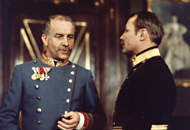the empire and authenticity
There are serious issues in referring to anyone in within the Austro-Hungarian Empire as authentic. However, this film seems to parallel Colonel Redl and Franz Ferdinand’s battle with their own personal authenticity.
In terms of Franz Ferdinand, as we’ve said before he was everything Franz Josef was not. His dis-shoveled look didn’t exactly reflect the Empire’s squeaky clean image. His smoking also reflected his lack of self control (remember the reference from the beginning of the film). Franz Ferdinand represented the empire’s future, and this vision was more than Redl could handle.
Redl himself was an entirely different can of worms. Here is a man who struggles with his national, religious, and sexual identity. The truest authenticity in the film was Redl’s loyalty to Franz Josef and the empire. Throughout the film, the viewer is confused about everything Redl stands for. However, his loyalty to the emperor is always genuine. The problem is, the empire that Redl worshipped had its own problems with its authenticity. Despite what Redl believed, Franz Josef was aging and the empire was hanging on by a thread. So, when Franz Josef told Redl to find a traitor to unify the empire, the Redl’s authenticity as well as the empire’s. How authentic could the empire be, if Redl had to find a traitor to save it?
In my mind, this film tied Redl’s downfall to the downfall of the empire. Redl seemed to embody every contradictory aspect of the empire. He represented the struggle that lots of people within the Astro-Hungarian empire had with their own national, religious, (and even sexual) identity. With a pressure to be Austrian, it would be easy for minorities to loose their identities in the mess. This whole debauchery with Redl really shook up the empire, and showed it was a mess it was really in.



No comments:
Post a Comment